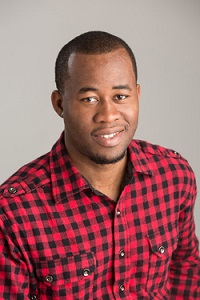Onafhankelijk van geboortedata
De Nigeriaanse schrijver Chigozie Obioma werd geboren in 1986 in Akure, in het zuidwestelijke deel van Nigeria, in een gezin van twaalf kinderen: met zeven broers en vier zussen. Toen hij opgroeide sprak hij Yoruba, Igbo, en Engels. Als kind was hij gefascineerd door de Griekse mythen en de Britse meesters, zoals Shakespeare, John Milton en John Bunyan. Onder Afrikaanse schrijvers, ontwikkelde hij een sterke affiniteit voor Wole Soyinka ’s “The Trials of Brother Jero”; Cyprianus Ekwensi’s “An African Night’s Entertainment”; Camara Laye’s “The African Child” en DO Fagunwa’s “Ògbójú Ọdẹ nínú Igbó Irúnmalẹ̀”, die hij las in de oorspronkelijke Yoruba versie. In 2009, terwijl hij op Cyprus woonde om zijn bachelor te voltooien aan de Cyprus International University, waar hij afstudeerde als beste van zijn jaargang, begon Obioma met het schrijven van “The Fishermen”. Het idee voor de roman kwam toen hij terugdacht aan de vreugde van zijn vader wegens de groeiende band tussen zijn twee oudste broers die, als kind een sterke rivaliteit kenden die soms uitmondden in vuistgevechten . Obioma wilde dat de roman commentaar leverde op de sociaal-politieke situatie in Nigeria: met de Britten als de profetie gekken, en het volk van Nigeria als de ontvangers van de visie dat (drie grote stammen die samenleven om een natie te vormen). Obioma beëindigde de roman tijdens een verblijf in OMI’s Ledig House in 2012 en voltooide een MFA in Creatief Schrijven aan de Universiteit van Michigan, waar hij de Hopwood Award voor fictie (2013) [en poëzie (2014) ontving. “The Fishermen” kwam op de shortlist voor de Man Booker Prize, op de shortlist voor de FT / Oppenheimer Funds Emerging Voices Award, op de shortlist voor de Center for Fiction First Novel Prize en op de shortlist voor de Edinburgh Festival First Book Award.
Uit: The Fishermen
“We were fishermen:
My brothers and I became fishermen in January of 1996 after our father moved out of Akure, a town in the west of Nigeria, where we had lived together all our lives. His employer, the Central Bank of Nigeria, had transferred him to a branch of the bank in Yola—a town in the north that was a camel distance of more than one thousand kilometres away—in the first week of November of the previous year. I remember the night Father returned home with his transfer letter; it was on a Friday. From that Friday through that Saturday, Father and Mother held whispering consultations like shrine priests. By Sunday morning, Mother emerged a different being. She’d acquired the gait of a wet mouse, averting her eyes as she went about the house. She did not go to church that day, but stayed home and washed and ironed a stack of Father’s clothes, wearing an impenetrable gloom on her face. Neither of them said a word to my brothers and me, and we did not ask. My brothers—Ikenna, Boja, Obembe—and I had come to understand that when the two ventricles of our home—our father and our mother—held silence as the fishermen the ventricles of the heart retain blood, we could flood the house if we poked them. So, at times like these, we avoided the television in the eight-columned shelf in our sitting room. We sat in our rooms, studying or feigning to study, anxious but not asking questions. While there, we stuck out our antennae to gather whatever we could of the situation.
By nightfall on Sunday, crumbs of information began to fall from Mother’s soliloquy like tots of feathers from a richly-plumed bird:
“What kind of job takes a man away from bringing up his growing sons? Even if I were born with seven hands, how would I be able to care for these children alone?”
Although these feverish questions were directed to no one in particular, they were certainly intended for Father’s ears. He was seated alone on a lounge chair in the sitting room, his face veiled with a copy of his favourite newspaper, the Guardian, half reading and half listening to Mother. And although he heard everything she said, Father always turned deaf ears to words not directly addressed to him, the kind he often referred to as “cowardly words.” He would simply read on, sometimes breaking off to loudly rebuke or applaud something he’d seen in the newspaper—“If there is any justice in this world, Abacha should soon be mourned by his witch
of a wife.” “Wow, Fela is a god! Good gracious!” “Reuben Abati should be sacked!”—anything just to create the impression that Mother’s lamentations were futile; whimpers to which no one was paying attention.“

Chigozie Obioma (Akure, 1986)
